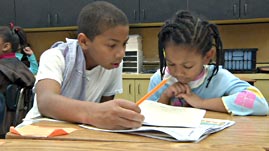Teachers' Domain - Digital Media for the Classroom and Professional Development
User: Preview


Source: WFSU





MARTHA SPEAKS, a PBS KIDS television series, aims to help children ages 4–7 build their oral vocabulary—an important early literacy skill. Over 500 students in schools in Leon and Gadsden Counties, Florida, have participated in the MARTHA SPEAKS Reading Buddies Program over the past three years. In this video from WFSU, media specialist Sherri Amundson and fourth-grade teachers Brian Lassiter and Polani Kimberl, describe the fun—and learning—that takes place during the program: First-grade and fourth-grade students pair up once a week to watch a MARTHA SPEAKS video, read together, practice vocabulary words, and do activities. The video shows the bond that forms between younger and older students, and demonstrates how the program brings about improvements not only in reading and vocabulary, but in social skills as well.
In recent years, elementary school teachers have become aware of the need to include explicit oral vocabulary instruction as part of a balanced literacy program. Research has shown that teaching “robust” or “rich” vocabulary will better help children prepare to read and understand not only literature, but science and social studies texts as well. Techniques such as multiple exposures to vocabulary words, providing child-friendly definitions, and words in context are useful in helping to build that vocabulary knowledge. The PBS KIDS Martha Speaks television series and the "Reading Buddies Program" are two tools that can be used to support teachers and students in vocabulary learning.
Several research studies have found that augmenting traditional classroom instruction with one-on-one interventions, such as a reading buddies program, is a powerful combination that can accelerate students’ oral vocabulary gains. The Martha Speaks "Reading Buddies Program" pairs kindergarten or 1st-grade students with 4th or 5th graders to meet one-on-one for eight 45-minute classroom sessions. Each session introduces four “special words” highlighted first in the selected Martha Speaks episode, and then reinforced as the buddy pairs share books, talk, and do fun activities together. The five steps of each "Reading Buddies Program" session—Watch Together, Talk and Play, Read Together, Write Together, and Wrap-Up—support and extend vocabulary learning by providing opportunities for Big Buddies and Little Buddies to hear and use these words in a variety of contexts, including the show, the related picture book, and their own life experience. At the end of the last session, Little Buddies take home a Certificate of Achievement that their Big Buddies have helped them complete. Big Buddies also get a Certificate of Achievement from their teacher.
An evaluation of the Martha Speaks "Reading Buddies Program," conducted by Dr. Rebecca Silverman at the University of Maryland (2009), revealed that this innovative version of a traditional cross-age reading program was effective at promoting the knowledge of target words emphasized in the program for both Big Buddies and Little Buddies. Because they get repeated practice in reading aloud, Big Buddies improve their reading fluency and learn some new words, too. The multiple exposures to words, which are clearly and simply defined, help the Little Buddies acquire, understand, and use new vocabulary.
In addition to the vocabulary-building benefits for younger and older students, there are broader literacy and social benefits as well. The fun atmosphere is a plus in the classroom and leads to an increased enjoyment and appreciation of books and reading. The relationship between the Big Buddies and Little Buddies is beneficial not only to each child, but to the entire school community, which gains a sense of a shared mission. As a result of their role as mentors, Big Buddies not only develop more confidence, self-esteem, leadership abilities, and organizational skills, they feel protective of their Little Buddies and invested in their improvement. Little Buddies experience school as a friendlier place and gain new role models to look up to. And finally, in collaborating together, teachers themselves may experience a newfound sense of enthusiasm and accomplishment as they see their students improve and mature.
 Loading Standards
Loading Standards